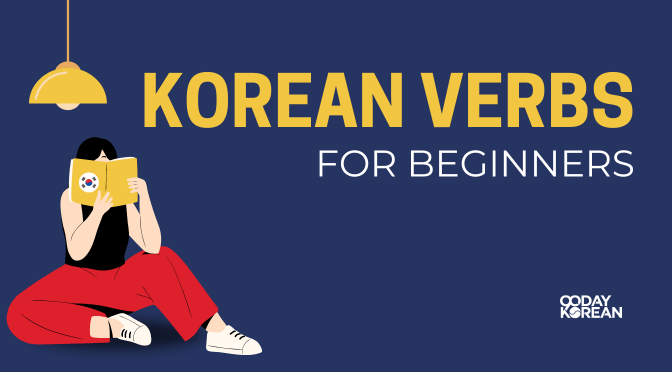Learning basic Korean verbs for beginners is a great way to approach a complex topic of Korean grammar more easily.

We’ll teach you the most common verbs in the Korean language below. Let’s get to it!
Most Common Korean Verbs
Learning Korean verbs is an essential step in learning Korean. They express actions, states, and events. In its basic form, the Korean verb always ends with 다 (da). For example, 먹다 (meokda) means “to eat,” and 가다 (gada) means “to go.”
List of the most common Korean verbs
Here’s a list of verbs that are related to daily activities:
| Korean | English |
|---|---|
| 가다 (gada) | to go out |
| 오다 (oda) | to come |
| 주다 (juda) | to give |
| 받다 (batda) | to receive |
| 자다 (jada) | to sleep |
| 먹다 (meokda) | to eat |
| 마시다 (masida) | to drink |
| 일어나다 (ireonada) | to wake up |
| 씻다 (ssitda) | to wash |
| 입다 (ibda) | to wear |
| 걷다 (geotda) | to walk |
| 놀다 (nolda) | to play or to have fun |
| 돕다 (dopda) | to help |
| 일하다 (ilhada) | to work |
| 만나다 (mannada) | to meet |
| 공부하다 (gongbuhada) | to study |
| 운동하다 (undonghada) | to exercise |
| 산책하다 (sanchaekhada) | to take a walk |
| 요리하다 (yorihada) | to cook |
| 청소하다 (cheongsohada) | to clean |
| 쇼핑하다 (syopinghada) | to shop |
| 운전하다 (unjeonhada) | to drive |
| 전화하다 ( jeonhwahada) | to call |
Korean Verb Conjugation Patterns
You can modify verbs to indicate different tenses and politeness levels. So, learning these patterns is important for communicating in Korean. Here are some common verb conjugation patterns:
Conjugation based on the Politeness Levels
There are two common polite speeches, which are 하십시오체 (hasipsioche) for formal speech and 해요체 (haeyoche) for polite informal speech.
For example, 갑니다 (gamnida) is the formal speech, and 가요 (gayo) is the polite informal form of 가다 (gada).
When speaking casually, 해체 (haeche) is commonly used. For example, 먹어 (meogeo) is the informal form of 먹다 (meokda).
Polite informal speech forms 해요체 (haeyoche) in present tense
The most common conjugation pattern is the polite informal speech forms. This form is used in everyday conversations such as at workplaces, shops, etc.
If the stem ends with Batchim (final consonant)
If the stem ends have the ㅗ /ㅏ, add 아요.
- 살다 (salda | to live) -> 살아요 (sarayo)
- 놀다 (nolda | to play)-> 놀아요 (norayo)
If the vowels are not ㅗ /ㅏ, 어요 is added.
- 먹다 (meokda | to eat) -> 먹어요 (meogeoyo)
- 입다 (ipda | to wear)-> 입어요 (ibeoyo)
If the stem ends without Batchim (final consonant)
If the vowel is ㅜ, 어요 is added:
- 주다 (juda | to give)-> 줘요 (jwoyo)* (shortened from주어요) *In speaking, the shortened version is commonly used.
If the vowel is ㅗ, 아요 is added.
- 오다 (oda | to come)-> 와요 (wayo)* (shortend from 오아요) *In speaking, the shortened version is commonly used.
If the vowel is ㅏ/ㅓ/ㅐ/ㅔ, add 요.
- 가다 (gada | to go) -> 가요 (gayo)
- 세다 (gayo seda | to count) -> 세요 (seyo)
If the vowel is l, change ㅣ to ㅕ and then add 요.
- 마시다 (masida | to drink) -> 마셔요 (masyeoyo)
If the vowel is ㅜ, change ㅜ to ㅝ and then add 요.
- 주다 (juda | to give) -> 줘요 (jwoyo)
If the vowel is ㅡ, change ㅡ to ㅓ and then add 요.
- 쓰다 (sseuda | to write) -> 써요 (sseoyo)
If the vowel is ㅡ, and the prior vowel is ㅗ/ㅏ, change ㅡ to ㅏ and then add 요.
- 모으다 (moeuda | to collect) -> 모아요 (moayo)
If the vowel is ㅟ/ㅚ, whether there is a Batchim (final consonant) or not, add 어요.
- 쉬다 (swida | to rest) -> 쉬어요 (swieoyo)
If the verb stem ends with 하, change 하 to 해 and add 요.
- 공부하다 (gongbuhada | to study) -> 공부해요 (gongbuhaeyo)
Verb Tense and Conjugation
To express different tenses, such as present, past, and future, you need to conjugate verbs by changing the verb stem.
To conjugate verbs into their polite informal form in the past tense, 았/었어요 (at/eosseoyo) is added. For the future tense, -ㄹ/을 거예요 (-r/eul geoyeyo) is added.
For example, 먹다 (meokda) becomes 먹어요 (meogeoyo) in the present tense and 먹었어요 (meogeosseoyo) in the past tense. For future tense, it becomes 먹을 거예요 (meogeul geoyeyo).
Negative Forms:
You can conjugate Korean verbs into negative forms by adding 안 (an) before the verb stem.
For example, “I don’t eat” is 안 먹어요 (an meogeoyo).
Polite command form
This verb conjugation is common as it can be used in many situations, and you will sound respectful. When telling someone to do something politely, you can add (으)세요 to the verb stem.
For example, 마시세요 (masiseyo) is the polite request form of the verb 마시다 (masida), meaning “to drink”. In a sentence, 물을 많이 마시세요 (mureul mani masiseyo) means “Drink a lot of water.”
Polite request form
When you are asking someone to do something, conjugate verbs using 아/어 주세요.
For example, 도와 주세요 (dowa juseyo) means “Please help.”
Conjugating “Hada” Verbs
There are various Korean verb endings, but many of these verbs end with 하다 (hada). Here are some common conjugations of Korean verbs ending with 하다 (hada):
Present Tense
- Formal (하십시오체 | hasipsioche): 나는 공부합니다 (naneun gongbuhamnida) – “I study.”
- Polite Informal (해요체 | haeyoche): 나는 공부해요 (naneun gongbuhaeyo) – “I study.”
- Casual (해체 | haeche): 나는 공부해 (naneun gongbuhae) – “I study.”
Past Tense
- Formal (하십시오체 | hasipsioche): 나는 어제 운동했습니다 (naneun eoje undonghaetseumnida) – “I exercised yesterday.”
- Polite Informal (해요체 | haeyoche): 나는 어제 운동했어요 (naneun eoje undonghaesseoyo) – “I exercised yesterday.”
- Casual (해체 | haeche): 나는 어제 운동했어 (naneun eoje undonghaesseo) – “I exercised yesterday.”
Future Tense
- Formal (하십시오체 | hasipsioche): 저는 한국어를 공부할 겁니다 (jeoneun hangugeoreul gongbuhal geosimnida gongbuhal geoyeyo gongbuhal geoya) – “I will study Korean.”
- Polite Informal (해요체 | haeyoche): 나는 한국어를 공부할 거예요 (naneun hangugeoreul gongbuhal geoyeyo) – “I will study Korean.”
- Casual (해체 | haeche): 나는 한국어를 공부할 거야 (naneun hangugeoreul geoya) – “I will study Korean.”
Negative Forms
You can conjugate Korean verbs into negative forms by adding 안 (an) before the verb stem. However, conjugating verbs ending with 하다 into negative form is different. For these verbs, insert “안” in the middle, before the 하다 part.
- Formal (하십시오체 | hasipsioche): 저는 요리 안 합니다 (jeoneun yori an hamnida) – “I study.”
- Polite Informal (해요체 | haeyoche): 나는 요리 안 해요 (naneun yori an haeyo) – “I study.”
- Casual (해체 | haeche): 나는 요리 안 해 (naneun yori an hae) – “I study.”
Polite command form
To make a polite command using verbs ending in 하다, simply change 하다 to 하세요.
고속도로로 운전하세요 (gosokdororo unjeonhaseyo) – “Drive to highway.”
Polite request form
To make a polite request, 주다’s polite command form 해 주세요 is used.
천천히 운전해 주세요(cheoncheonhi unjeonhae juseyo) – “Drive slowly please.”
Korean Irregular Verbs
Some verbs do not follow standard Korean conjugation patterns. These verbs often have unique conjugation rules, which need to be memorized. Familiarizing yourself with this will help you determine the appropriate conjugation patterns to use.
ㄷ irregular
Korean verb “걷다” (deotda), meaning “to walk,” doesn’t follow a regular pattern. The ㄷ Batchim of the verb stem becomes ㄹ and then conjugated as normal.
걷다 (geotda | to walk) -> 걸어요 (georeoyo)
ㅅ irregular
Some verbs with ㅅ Batchim in their verb stem are irregular. The ㅅ is dropped and conjugated as normal.
낫다 (natda | to recover) -> 나아요 (naayo)
ㅂ irregular
The ㅂ Batchim is replaced with 우, then added to the following conjugation Korean word.
눕다 (nupda | to lie down) -> 누워요 (nuwoyo) *우+어 ->워
ㅡ irregular
For ㅡ irregular verbs, you need to check the second to last syllable of its verb stem. If its vowel is ㅏ or ㅗ, ㅏ replaces ㅡ in the last syllable. If the vowel in this syllable is not ㅏ or ㅗ, ㅓ replaces ㅡ in the last syllable.
잠그다 (jamgeuda | to lock) -> 잠가요 (jamgayo)
르 irregular
When conjugating 르 irregular verb, extra ㄹ is added to the syllable before 르 in its verb stem. And then 르 becomes either 러 or 라, depending on the vowel of the syllable before 르.
고르다 (goreuda | to choose) -> 골라요 (gollayo)
ㄹ irregular
For some verbs that have ㄹ Batchim in their final syllable of the stem, their ㄹ 받침 will be dropped when conjugating with the polite request -(으)세요. Then, you will just conjugate as normal.
열다 (yeolda | to open) -> 여세요 (yeoseyo)
Conclusion
If you are a beginner, we recommend starting with simple verbs and gradually extending your vocabulary and Korean verb conjugations as you progress.
If you come across unfamiliar words, being equipped with a Korean dictionary would help. Find out more about our recommendations here.
The post Korean Verbs for Beginners – Your Easy Grammar Guide appeared first on 90 Day Korean.
 Learn to read Korean and be having simple conversations, taking taxis and ordering in Korean within a week with our FREE Hangeul Hacks series: http://www.90DayKorean.com/learn
Learn to read Korean and be having simple conversations, taking taxis and ordering in Korean within a week with our FREE Hangeul Hacks series: http://www.90DayKorean.com/learn
Korean lessons * Korean Phrases * Korean Vocabulary * Learn Korean * Learn Korean alphabet * Learn Korean fast * Motivation * Study Korean


Recent comments